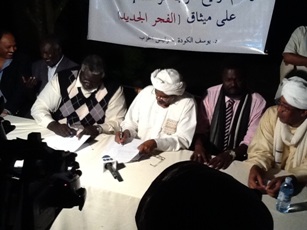Sudan hopes reports on Uganda banning rebel meetings are true
May 7, 2013 (KHARTOUM) – The Sudanese government has responded cautiously to a report carried by state media on Monday which claimed Uganda had banned anti-Khartoum rebels from meeting on its territory again.

Minni Minnawi and Abdel-Wahid Mohamed Nur, the leaders of two separate factions of the Sudan Liberation Movement – the SLM-MM and SLM-AW respectively, as well as Ayoub Mohamed of Darfur People’s Unity Movement were reportedly present at the meeting.
Sudanese foreign ministry spokesperson Abu-Bakr al-Sideeg Mohammed Al-Amin, expressed hope that the report is true, adding that Kampala has an obligation to refrain from backing rebel movements.
Al-Amin said that Uganda’s current chairmanship of the International Conference on the Great Lakes Region (ICGLR) and its membership in the African Union Peace and Security Council (AUPSC), as well as other international blocs, requires not only the banning of rebel groups from holding meetings but also denying them existence within Ugandan territory.
In 2011, the ICGR designated the Darfur rebel groups Justice and Equality Movement (JEM) and Sudan Liberation Movement (SLM) as negative forces that should be combated.
The Sudanese diplomat stressed that rebel meetings are held only to plan and prepare for acts of sabotage, aggression and targeting of civilians, noting the recent attacks by the Sudan Revolutionary Front (SRF) on areas in North and South Kordofan states.
“There is no objection on our part to establishing good and normal relations with Uganda. We have the desire and the will to do so and the Ugandan move [to ban rebel groups] serves in the same direction”, he said.
Khartoum and Kampala have a long history of troubled relations over alleged support to rebel groups on both sides of their borders.
Kampala says that Khartoum continues to provide support and refuge to notorious Ugandan rebels the Lord’s Resistance Army (LRA) even after South Sudan’s secession in July 2011 created a buffer zone between Sudan and Uganda.
Khartoum on the other hand says that Kampala has become a safe harbour for Sudanese rebel leaders.
Last January, Sudanese opposition parties and rebel groups signed a charter in Kampala known as the “New Dawn”, which aimed to topple the Khartoum regime via different political and military means.
This has prompted Khartoum to lodge several complaints with the African Union (AU) and other regional blocs against Kampala, saying the latter is supporting regime change in Sudan.
Last March, the speaker of the Sudan’s national assembly, Ahmed Ibrahim al-Tahir, said that the Sudanese government is working with forces in Uganda that are opposed to president Yoweri Museveni to bring about “positive political influence”.
In response to the remarks, Uganda’s foreign affairs minister, Sam Kutesa, warned that if Sudan continues supporting forces opposed to the Uganda government, they will be defeated.
“Sudan has always supported LRA leader Joseph Kony, if they want to continue they will meet the same end of defeat. Uganda is not going to promote any groups against the government of Sudan”, Kutesa told New Vision newspaper in Kampala at the time.
He went on to say that the two countries have a bilateral mechanism of resolving problems between the two countries.
Uganda’s top diplomat also warned that if Sudan were to expel any staff from Uganda’s embassy in Sudan, as it has threatened, Kampala would reciprocate.
(ST)
